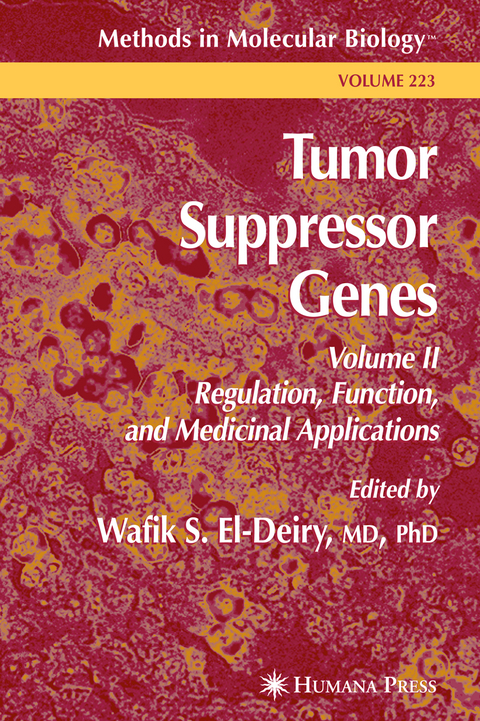
Tumor Suppressor Genes
Humana Press Inc. (Verlag)
978-0-89603-987-2 (ISBN)
Understanding the Function and Regulation of Tumor Suppressor Genes.- Utilizing NMR to Study the Structure of Growth-Inhibitory Proteins.- Generation and Application of Phospho-specific Antibodies for p53 and pRB.- Stability and Ubiquitination of the Tumor Suppressor Protein p53.- Role of Tumor Suppressors in DNA Damage Response.- In Situ Hybridization in Cancer and Normal Tissue.- Genetic Strategies in Saccharomyces cerevisiae to Study Human Tumor Suppressor Genes.- Electrophoretic Mobility Shift Analysis of the DNA Binding of Tumor Suppressor Gene Products.- Analysis of Gene Promoter Regulation by Tumor Suppressor Genes.- DNA Footprinting.- Identification of DNA-Binding of Tumor Suppressor Genes by Chromatin Immunoprecipitation.- Co-immunoprecipitation of Tumor Suppressor Protein-Interacting Proteins.- Microarray Approaches for Analysis of Tumor Suppressor Gene Function.- Analysis of Tumor Suppressor Gene-Induced Senescence.- Yeast Two-Hybrid Screening as a Means of Deciphering Tumor Suppressor Pathways.- Somatic Cell Knockouts of Tumor Suppressor Genes.- Colony Growth Suppression by Tumor Suppressor Genes.- Flow Cytometric Analysis of Cell Cycle Control by Tumor Suppressor Genes.- Analysis of Cyclin-Dependent Kinase Activity.- Tumor Suppressor Gene-Inducible Cell Lines.- In Vitro Models of Early Neoplastic Transformation of Human Mammary Epithelial Cells.- Tumor Suppression Through Angiogenesis Inhibition.- Flow Cytometric Analysis of Tumor Suppressor Gene-Induced Apoptosis.- Functional Analysis of Tumor Suppressor Genes in Mice.- The Tissue Microenvironment as an Epigenetic Tumor Modifier.- Analyzing the Function of Tumor Suppressor Genes Using a Drosophila Model.- Assembling a Tumor Progression Model.- Conformation-Sensitive Gel Electrophoresis for Detecting BRCA1Mutations.- Medicinal Applications of Tumor Suppessors.- Conversion Technology and Cancer Predispositions.- Discovering Novel Anticancer Drugs.- Targets in Apoptosis Signaling.- Tumor Deprivation of Oxygen and Tumor Suppressor Gene Function.- Hormonal and Differentiation Agents in Cancer Growth Suppression.- Regulation of NF-?B by Oncoproteins and Tumor Suppressor Proteins.- Blocking Survivin to Kill Cancer Cells.- Targeting the Mitochondria to Enhance Tumor Suppression.- Novel Approaches to Screen for Anticancer Drugs Using Saccharomyces cerevisiae.- Tumor Suppressor Gene Therapy.- Therapeutic Strategies Using Inhibitors of Angiogenesis.- Isolation of p53 Inhibitors by Screening Chemical Libraries in Cell-Based Readout System.
"The book will prove a great help to everybody who would like to enter the field of experimental and or clinical research. Those who are interested in basic understanding microbiology of cancer will enjoy this as well." -Neoplasma
| Reihe/Serie | Methods in Molecular Biology ; 223 |
|---|---|
| Zusatzinfo | XIX, 657 p. |
| Verlagsort | Totowa, NJ |
| Sprache | englisch |
| Maße | 178 x 254 mm |
| Themenwelt | Medizin / Pharmazie ► Medizinische Fachgebiete ► Onkologie |
| Studium ► 2. Studienabschnitt (Klinik) ► Humangenetik | |
| Naturwissenschaften | |
| ISBN-10 | 0-89603-987-0 / 0896039870 |
| ISBN-13 | 978-0-89603-987-2 / 9780896039872 |
| Zustand | Neuware |
| Haben Sie eine Frage zum Produkt? |
aus dem Bereich


